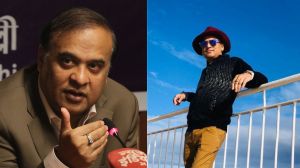McCain meltdown
Despite the fond Republican hopes for a late swing in favour of Senator John McCain, the only question now is about the margin of victory that Senator Barack Obama...

Despite the fond Republican hopes for a late swing in favour of Senator John McCain, the only question now is about the margin of victory that Senator Barack Obama can generate for the Democrats. In the last few days, Obama has maintained a consistent lead of over 7 per cent in the national opinion polls. Even more important he has for the first time managed to cross the 50 per cent barrier.
Pollsters say undecided voters, who now form around 7 per cent of likely voters, usually tend to break in favour of the Republicans. Even if McCain benefits from that, he is behind in so many important states that it may now be too late for him to make a comeback. Early post-mortems suggest that the Republicans have been outgunned in every department of the electoral game. While the economic crisis has surely helped the Democrats, Obama has out-thought McCain—whether it was the choice of a vice presidential running mate or running a disciplined campaign.
Despite his record as a moderate Republican, and his reputation for ‘maverick’ political positions against the party orthodoxy, McCain has found himself steadily losing the middle ground. In the primaries, McCain attracted many independent and Democratic voters raising the hope that he would campaign from the centre.
The decision to appease the right wing of the Party, which was not enthusiastic about his candidacy, might have been McCain’s biggest error. Choosing the Alaska Governor Sarah Palin, certainly energised the party base but put off many voters in the middle. As he sought to paint Obama as “un-American” and “socialist”, McCain failed to deliver a credible political message of his own.
A new coalition
Four years ago, when George W. Bush won his re-election, despite the unpopularity of the Iraq war and high oil prices, there was much discussion about the abiding power of American conservatism. It appeared that the Democrats were out of touch with a large segment of the American population and that a Republican majority was indeed permanent. Even when the Republicans lost control of the Congress in the 2006 mid-term elections, few were willing to bet that Democrats could stitch together a national coalition that can win more often.
A victory for Obama will be historic not just because he is an African American. It will be historic because, he is the first northern liberal in the United States to win the presidency since John F. Kennedy in the 1960s. Since then, the Democrats have steadily lost ground in the South, among the suburban voters and the white working classes. It is Obama’s success in drawing together a diverse set of social classes that might be long remembered after the celebrations of his victory tonight.
Reining in the left
With the Democrats set to significantly increase their majorities in both the House of Representatives and the Senate, Obama’s biggest political challenge will come from his own party rather than the Republicans.
Like the Congress premiers in India and the Labour ones in Britain, the biggest headache for a Democratic White House is to fend off pressures from the left liberals on policy-making. The left liberals have been the first and most vociferous supporters of Obama. They would want their pound of flesh, and soon.
They are determined to push Obama into raising taxes and increasing social spending, steps that are sure to alienate the middle classes. Some of the liberals are also demanding a cut in defence spending, a sacrilege for national security conscious Republicans and conservative Democrats. During the campaign, Obama has been smart enough not to get into detailed discussions about his economic strategy or social policies.
A day after the elections, when the economy stops being his friend and becomes an enemy, Obama will be called upon to reveal the broad direction of his policies. That will set the stage in turn for disappointing at least some of his major support bases.
Obama will eventually be judged by his ability to rule from the centre and sustain support from a constantly shifting coalition of forces. Obama will need all the ideological flexibility and tactical skill that he has demonstrated during the campaign to become a successful president.
The writer is a Professor at the S. Rajaratnam School of International Studies, Nanyang Technological University, Singapore. iscrmohan@ntu.edu.sg



- 01
- 02
- 03
- 04
- 05




























